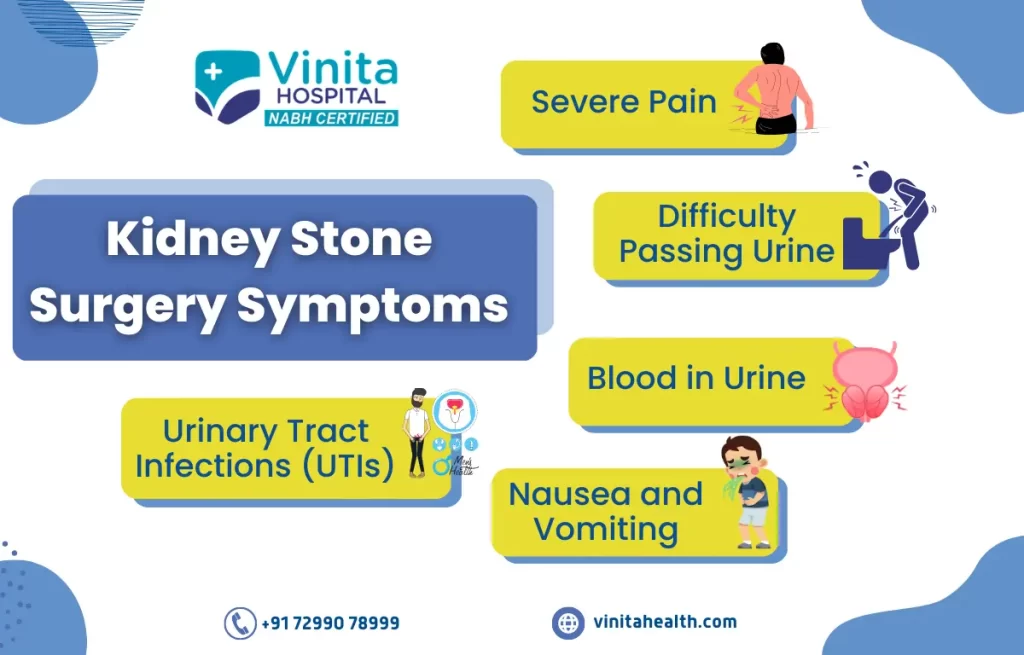Surgery is considered the best option for removing kidney stones when the stones are too large to pass naturally or when other conservative measures, such as pain management and drinking plenty of fluids, have failed to alleviate symptoms.
Kidney stones that are greater than 2 cm in diameter are often too large to pass on their own and kidney stone treatment in Chennai may be required to remove them. Additionally, kidney stones that are causing severe pain, infection, or obstruction of the urinary tract may also require surgical intervention.
Surgery for Kidney Stones
The type of surgery performed depends on the size, location, and number of stones present. There are several options available for kidney stone surgery in Chennai for removing kidney stones including:
Ureteroscopy
This kidney stone surgery in Chennai involves passing a small scope through the urethra and bladder to the ureter and stone. A small basket or laser is used to remove the stones or fragments. This procedure is typically performed as an outpatient procedure and requires general or regional anesthesia. Ureteroscopy is effective for stones located in the mid or lower ureter.
During the procedure, a small basket or laser may be used to remove the stone or fragments. The fragments are then passed naturally through the urinary system. It is often used for stones that cannot be treated with ESWL with an affordable kidney stone removal surgery cost in Chennai or for patients who have had previous ESWL treatments that were not successful.

Check out Gynaecologist in Chennai.
Extracorporeal Shock Wave Lithotripsy (ESWL)
This is a non-invasive procedure that uses high-energy shock waves to break up the stones into smaller pieces that can be passed naturally. This outpatient procedure does not require incisions or general anesthesia. ESWL is effective for stones located in the renal pelvis or upper ureter.
During the procedure, the patient lies on a table with their affected kidney positioned over a shock wave generator. The shock waves pass through the skin and tissues to reach the stone, breaking it into smaller pieces. The fragmented stones are then passed naturally through the urinary system. This kidney stone surgery in Chennai is a relatively safe procedure with a low risk of complications, such as bleeding, infection, or damage to surrounding structures.
Percutaneous Nephrolithotomy (PNL)
This kidney stone surgery in Chennai is a more invasive procedure that involves making a small incision in the back and using a scope to remove the stones. This procedure requires general anesthesia and a few days of hospital stay. PNL is typically reserved for larger stones or stones that are located in a difficult-to-reach area.
Patients typically need several days to recover from the procedure and may experience some mild discomfort or pain during this time. Most patients are able to return to normal activities within a week, although it may take several weeks for the urinary system to fully recover.
Robotic-Assisted Kidney Stone Removal
Robotic-assisted kidney stone removal, also known as robotic pyelolithotomy, is a minimally invasive surgical procedure used to remove large or complex kidney stones. This kidney stone surgery in Chennai is performed using a robotic surgical system that provides the surgeon with enhanced visualization, precision, and control.
During the procedure, the surgeon makes several small incisions in the patient’s abdomen and inserts a camera and robotic arms equipped with surgical instruments. The surgeon uses the robotic arms to carefully remove the kidney stones while viewing a magnified, high-definition 3D image of the surgical site. However, this type of kidney stone surgery in Chennai may not be suitable for all patients, and individual cases should be evaluated by a healthcare professional to determine the best course of treatment.
Laparoscopic Nephrolithotomy
This is a minimally invasive procedure performed through small incisions in the abdomen. The stones are removed with the aid of a scope and instruments. A laparoscope, which is a long, thin, tube with a camera and light attached to it, is then inserted through one of the incisions to visualize the kidney and stones. The stones are then fragmented using a laser or other instruments and removed through the incisions.
It is considered to be a highly effective method for removing large or complex kidney stones and has a high success rate. As with any surgical procedure, there is a risk of bleeding, infection, or damage to surrounding structures with laparoscopic nephrolithotomy. Pain and discomfort are common after the kidney stone surgery in Chennai, and pain medications may be necessary to manage symptoms.
Key Surgical Methods for Kidney Stone Removal:
- Extracorporeal Shock Wave Lithotripsy (ESWL): Utilizes shock waves to break down stones into small pieces.
- Ureteroscopic Lithotripsy (URSL): Involves a ureteroscope to visualize and fragment stones.
- Percutaneous Nephrolithotomy (PCNL): A minimally invasive procedure for larger stones, requiring a small incision.
- Retrograde Intrarenal Surgery (RIRS): Employs a flexible scope to access and treat stones in the kidney.
Pain Management Post-Surgery:
- Anesthesia Usage: Kidney stone surgery in Chennai is generally painless during the procedure due to anesthesia.
- Postoperative Discomfort: Patients may experience mild pain and discomfort for 2-3 days post-surgery.
- Medication: Doctors prescribe effective medication to manage any post-surgical pain.
These advanced surgical options in Chennai, combined with expert postoperative care, ensure a smoother recovery process for patients undergoing kidney stone surgery in Chennai.
Benefits and Risks of Kidney Stone Surgery in Chennai
As with any medical procedure, there are risks and benefits associated with kidney stone surgery in Chennai.
Benefits
- Pain Relief: The most significant benefit of kidney stone removal surgery is that it can provide relief from the pain caused by kidney stones. Once the stones are removed, the pressure and pain associated with them are relieved.
- Prevention of Complications: Kidney stones can lead to complications such as urinary tract infections, kidney damage, or obstructive uropathy. Removal of the stones can prevent these complications.
- Improved Urinary Function: After the kidney stone surgery in Chennai, patients can experience improved urinary function as the stones are no longer blocking the urinary tract.
Risks
- Infection: As with any kidney stone surgery in Chennai, there is a risk of infection. This risk can be avoided by taking antibiotics before and after the procedure.
- Bleeding: Kidney stone removal surgery can cause bleeding, which may require blood transfusions or further surgery.
- Damage to Surrounding Organs: In rare cases, the surgery can cause damage to the surrounding organs such as the bladder, ureter, or kidneys.
- Recurrence of Stones: Even after surgery, there is a risk of the formation of new stones.
- Anesthesia-Related Risks: Kidney stone surgery in Chennai requires anesthesia, which can cause complications such as allergic reactions, breathing problems, or heart problems.
Types of Kidney Stones Surgery
- Extracorporeal Shock Wave Lithotripsy (ESWL): Non-invasive method using shock waves to break down stones.
- Ureteroscopy (URS): Minimally invasive procedure employing a thin tube to remove or break stones in the ureter or kidneys.
- Percutaneous Nephrolithotripsy (PCNL): Invasive surgery involving a small incision to remove larger kidney stones.
- Laser Lithotripsy: Using laser energy to break down stones during various procedures like ureteroscopy or PCNL.
- Open Surgery (Nephrolithotomy): Traditional surgical approach involving a larger incision to remove stones directly.
Diagnosis of Kidney Stones Surgery
Diagnosing kidney stones typically involves a combination of medical imaging and laboratory tests:
Imaging Studies
- CT Scan: Provides detailed images to identify and locate stones.
- Ultrasound Scan: Detects stones using sound waves without radiation.
- X-ray: Reveals the presence and location of stones.
Laboratory Tests
- Urinalysis: Detects minerals and substances indicative of stone formation.
- Blood Tests: Assess kidney function and identify underlying causes.
Once diagnosed, surgical options like laser lithotripsy or other interventions are considered based on stone size and location.
Conclusion
To conclude, it is important to consider the benefits and risks of each surgical option besides kidney stone removal surgery cost in Chennai. You should discuss them with a healthcare provider before opting for any surgical method.
Read also Best Gynaecologist Hospital in Chennai.





